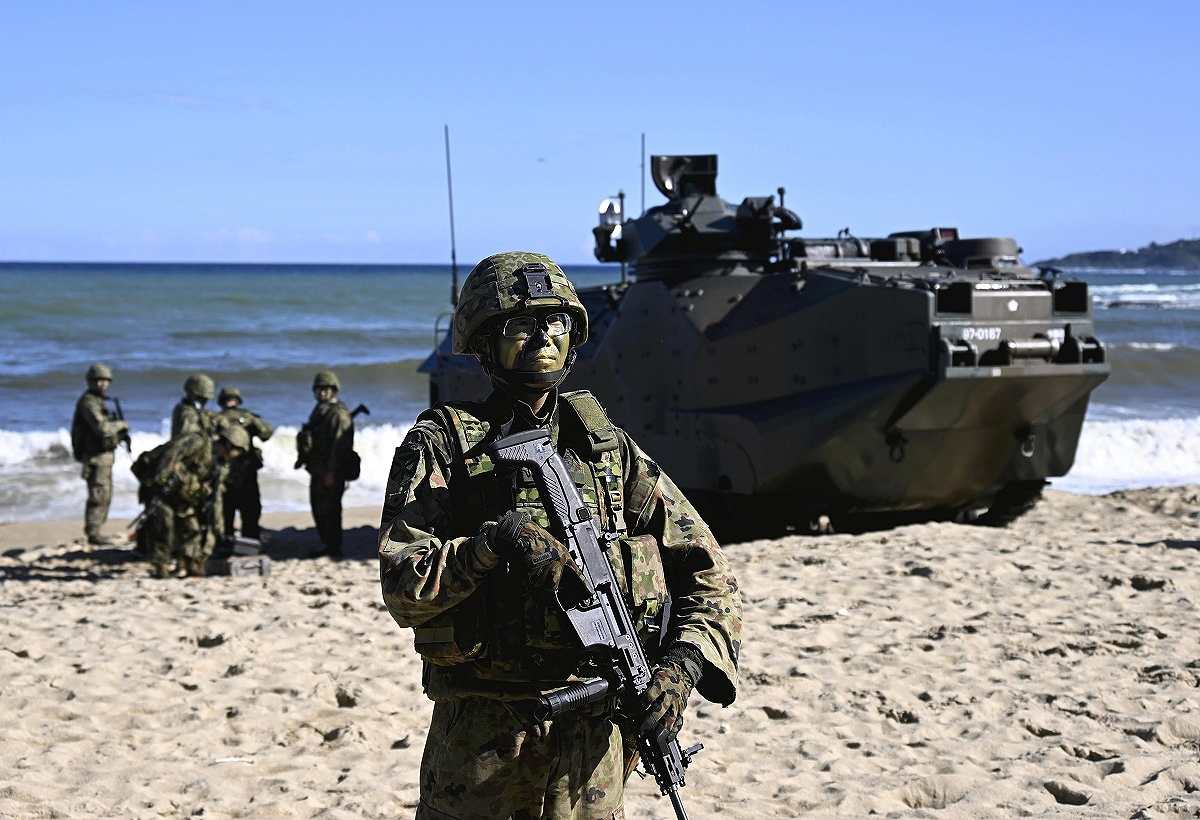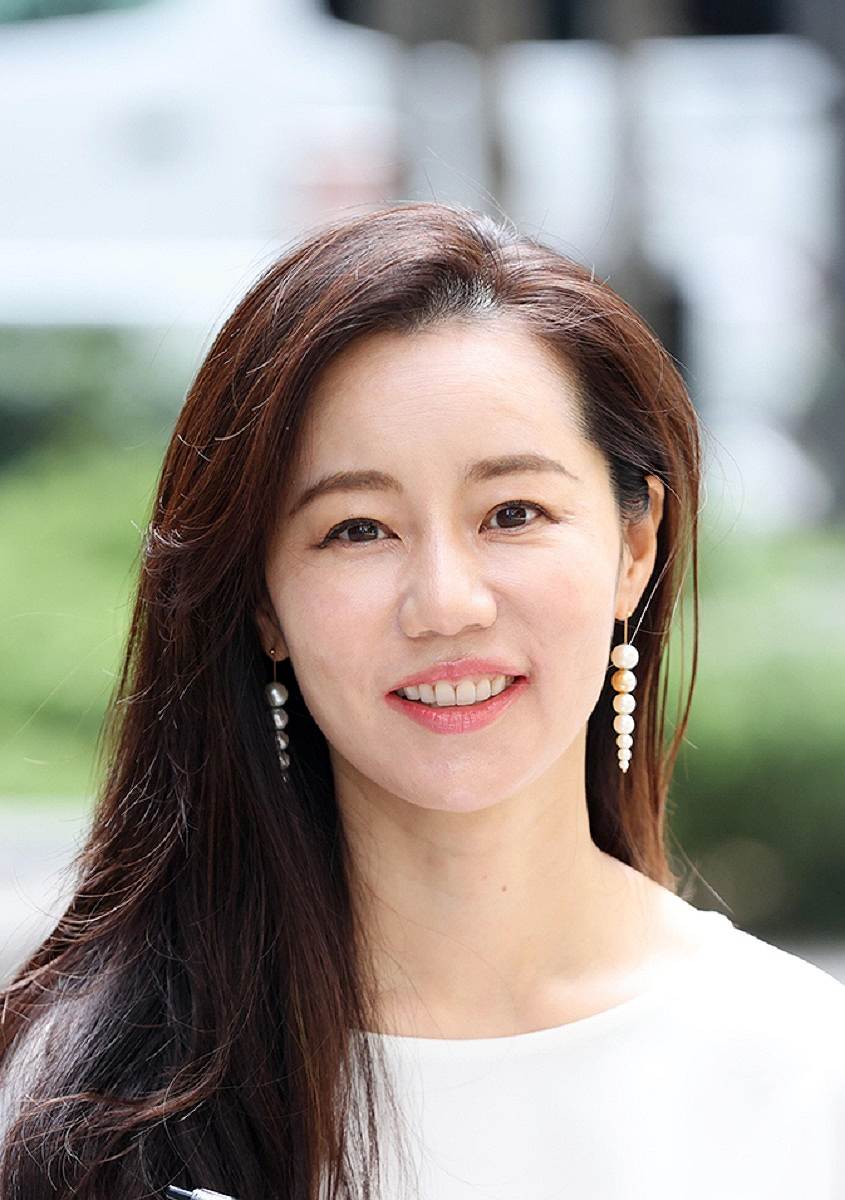
Members of Japan’s Ground Self-Defense Force train with an amphibious vehicle on a beach in the Nansei Islands.
8:00 JST, July 29, 2023
Okinawa Prefecture, at the southern tip of Japan, was once an independent kingdom called Ryukyu, which became unified in the 15th century. The people of the Ryukyu Kingdom were known for their boldness in venturing out to sea and trading extensively with Japan and other neighbors, including China and Southeast Asian countries. The Ryukyu Kingdom, which had a tributary relationship with Ming dynasty China, was invaded by Japan in the 17th century, after which it maintained a subordinate relationship with Japan — while simultaneously seeming to continue its relationship with China, which at that time was ruled by the Qing dynasty.
In 1879, the Ryukyu Kingdom was officially incorporated into Japan as Okinawa Prefecture. In 1945, during the final period of World War II, Okinawa became a battleground when U.S. troops landed there. More than 120,000 Okinawan people lost their lives for the “defense of mainland Japan.” After the war ended, Okinawa remained under U.S. occupation until 1972. Its war-torn history contributed to Okinawa’s economic disparity with the rest of Japan — according to a central government survey, the average income of Okinawans is among the lowest in the nation. The economic gap with the rest of Japan remains wide.
Okinawa has a complicated and tragic history. It also has a geopolitically strategic location halfway between the major Japanese island of Kyushu and Taiwan. The southern islands of Japan, centered on Okinawa, are collectively called the “Nansei Islands.” The Senkaku Islands are also located in Okinawa Prefecture. Okinawa faces China across the East China Sea and is relatively close to the Korean Peninsula, known as one of the world’s “powder kegs.”
The strategic value of Okinawa is enormous. This is why the Japanese government has been taking steps to strengthen its defense capabilities, including the deployment of Self-Defense Force missile units to the Nansei Islands, with an eye toward deterring China’s designs on the region. The U.S. military has about 30 bases and military-related facilities in Okinawa, which will be of great importance if China invades Taiwan. Because of its strategic importance, Okinawa has been called the “keystone of the Pacific” by the U.S. military.
It is within this context that China’s renewed attention to Okinawa should be taken more seriously by Tokyo and its like-minded partners.
The People’s Daily, the official newspaper of the Chinese Communist Party (CCP), reported on its front page on June 4 that President Xi Jinping had made a telling statement concerning China’s deep relationship with the Ryukyu Islands. Xi reportedly said that when he was working in Fuzhou, Fujian Province, he learned that the roots of exchanges with the Ryukyu Islands were deep.
Following Xi’s remarks, another unusual event occurred in early July, when the Chinese government extended a warm welcome to a delegation that included Okinawa Gov. Denny Tamaki and others visiting Beijing. Tamaki and other delegation members met with Chinese Premier Li Qiang, a close ally of Xi. They received a positive response regarding Okinawa’s request to resume direct flights between China and Okinawa. Tamaki also visited Fujian Province, in regard to which Xi mentioned historical relationships with Okinawa, and had dinner with senior provincial leaders.
The People’s Daily’s recent coverage of Xi’s remarks is not the first time that the party’s official mouthpiece focused its propaganda on Okinawa. The People’s Daily had previously covered the Ryukyu Islands in an article in 2013 at the height of tensions over the Senkaku Islands. The paper cited two scholars’ claims that if the Ryukyu Islands had belonged to China’s Ming dynasty, it was questionable whether Okinawa really belongs to Japan even now. At that time, experts analyzed this to mean that China aimed to influence the Japanese side on the issue of ownership of Okinawa’s Senkaku Islands, which China claims as its territory.
Now, 10 years later, China’s intentions seem even darker. The aim appears to be to emphasize a direct relationship between Okinawa and China and further drive a wedge into Okinawa’s relationship with the rest of Japan.
Why does China think this tactic might work? Because Okinawa, with its roots in the Ryukyu Kingdom, has a unique sense of its own identity. According to an opinion poll released in 2023 by Meisei University in Tokyo and others, only about 15% of the respondents defined themselves solely as “Japanese.” More than half said they were “Both Okinawan (Uchinanchu) and Japanese.”
In addition, there is strong, longstanding antipathy among the Okinawan public toward the central government. Each local election is a close contest between the conservative, nationally ruling Liberal Democratic Party and the liberal opposition parties. The current governor used to be a member of the House of Representatives as part of the former Democratic Party of Japan (DPJ) and has vocally expressed concern about the policies of current LDP Prime Minister Fumio Kishida’s government to strengthen defense capabilities in the Nansei Islands. Tamaki has also called for the relocation of U.S. military bases.
It is not only Tamaki but also average Okinawans who have a deep-seated distrust of Japan’s central government due to the history of war and occupation and the problems of the U.S. military presence in Japan.
But for China, Okinawa is part of the “first island chain,” which the CCP views as a defensive line to prevent U.S. forces from entering the East China Sea. There should be no doubt that the Chinese side sees Okinawa as strategically important for its anti-access/area-denial (A2/AD) strategy. Therefore, it is not surprising that China would renew its overt political maneuvers directed at Okinawa.
Several research institutes in the U.S. and Europe have already sounded the alarm, although they have received little notice in Japan. An analysis published by the Jamestown Foundation in the U.S. in 2019 states, “Growing local opposition to U.S. military bases in Okinawa, and animosity towards the Japanese central government, have coincided with increased CCP attempts to engage with the island.” Both Institute for Strategic Research at France’s Military College (IRSEM) and the U.S.-based Center for Strategic and International Studies (CSIS) published separate reports to ring alarm bells concerning Chinese political warfare directed against Japan and how China may be encouraging an independence movement in Okinawa.
The chairman of the U.S. Congressional Select Committee on the Strategic Competition between the U.S. and the Chinese Communist Party, Republican Rep. Mike Gallagher, told The Yomiuri Shimbun that although he knows only a little about Okinawa politics, “to me, it’s obvious that the CCP has ambitions [that] extend well beyond the borders of China and beyond Taiwan.” He added, “My view is that China not only wants to be the dominant power in the region, but the dominant power globally, and so I think we should be very careful about their ambitions.”
Indeed, Japan should be more aware of China’s manipulative intentions and activities — particularly as they relate to strategically important places like Okinawa. The Japanese people should be more vigilant against Chinese political maneuvering.
Political Pulse appears every Saturday.

Yuko Mukai
Mukai is a Washington correspondent of The Yomiuri Shimbun.
Top Articles in Editorial & Columns
-

Riku-Ryu Pair Wins Gold Medal: Their Strong Bond Leads to Major Comeback Victory
-

Reciprocal Tariffs Ruled Illegal: Judiciary Would Not Tolerate President’s High-Handed Approach
-

China Provoked Takaichi into Risky Move of Dissolving House of Representatives, But It’s a Gamble She Just Might Win
-

Japan’s Plan for Investment in U.S.: Aim for Mutual Development by Ensuring Profitability
-

Flu Cases Surging Again: Infection Can Also Be Prevented by Humidifying Indoor Spaces
JN ACCESS RANKING
-

Producer Behind Pop Group XG Arrested for Cocaine Possession
-

Japan PM Takaichi’s Cabinet Resigns en Masse
-

Man Infected with Measles Reportedly Dined at Restaurant in Tokyo Station
-

Israeli Ambassador to Japan Speaks about Japan’s Role in the Reconstruction of Gaza
-

Videos Plagiarized, Reposted with False Subtitles Claiming ‘Ryukyu Belongs to China’; Anti-China False Information Also Posted in Japan
























